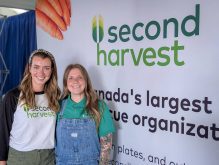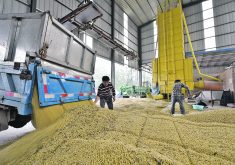Canadian Cattlemen’s Association takes aim at Friends of the Earth for claims that cattle production wastes farmland
Supporters of organic agriculture say they would have no problem feeding the world.
Kendra Klein, staff scientist with Friends of the Earth, said the deeply entrenched narrative that organics is incapable of feeding a growing population is false.
It is also the conclusion of a new report released by the organization called Farming for the Future: Organic and Agroecological Solutions to Feed the World.
“We now know that organic farming can yield enough to feed the world,” she said during a conference call promoting the report.
Read Also

Gene editing digs deeper space in Canadian plant breeding
More Canadian research into crop variety development is incorporating gene editing, and one researcher notes that Canada’s regulatory approach to gene editing will help drive innovation
Frances Moore Lappe, director of the Small Planet Institute, disputes the notion that industrial agriculture is the saviour of the planet and the only way to feed a growing population.
She said there would be an abundance of food if people ended their obsession with eating animals.
Three-quarters of the world’s agricultural land, including pastures, is devoted to producing animal protein, which only delivers 17 percent of global calories.
“Half of the world’s calories from crops don’t go to people directly,” said Lappe.
She said that out of every 100 calories cattle consume in feed, humans get three back from eating the beef.
“Cattle are the best calorie shrinkers,” said Lappe.
She said the problem isn’t food scarcity but rather a scarcity of democracy. Government policies favour meat production, which only the rich can afford.
Tom Lynch-Staunton, issues manager for the Canadian Cattlemen’s Association, disputes Lappe’s findings.
“Her argument that all this land can be used for human food as opposed to going to cattle is just not true,” he said.
In Canada, 80 percent of what a cow eats in its lifetime is forage grown on marginal land not suitable for annual crops, and less than 10 percent of cropland is used for feed crops. Almost all of the crops that are grown every year are grown for human consumption.
“It’s when they don’t make the grade that they’re diverted into cattle feed,” he said.
Lynch-Staunton also pointed out that the conversion rate isn’t nearly as abysmal as Lappe suggests.
It takes six kilograms of feed in a feedlot to produce one kilogram of beef. And that beef is rich in protein, iron, zinc and vitamin B, so it’s more nutritious than an equivalent amount of crops.
Lauren Ponisio, a conservation biologist from the University of California, Berkeley, said a meta-analysis of 115 studies conducted over the last 35 years shows that conventional agriculture out-yields organic agriculture by an average of 19 percent.
However, the gap is reduced to six to nine percent when comparing the results of organic farms that practice diversification, such as growing a wide variety of crops in the same field and using rotations that include cover crops.
John Reganold, professor of soil science and agroecology at Washington State University, said there are considerations beyond yield when determining the value of organic agriculture.
He has reviewed 17 meta-analyses comparing the nutritional value of eating organic versus conventional food, 14 of which found some evidence that organic is more nutritious.
It contains little to no pesticide residue compared to conventional and is higher in vitamin C, antioxidants and omega 3 fatty acids.
“If you look at the quality of food, organic is better,” he said.
Reganold said organic farming is also better for the soil, results in less contamination of ground and surface water and is more profitable, according to another meta-analysis of 44 studies.
The profitability analysis shows that organic farming delivers 22 to 35 percent more net returns to farmers than conventional agriculture because of price premiums that average 29 to 32 percent higher than conventional prices.
“Organic agriculture now occupies about one percent of the cropland worldwide. Why can’t that be 10 or 15 percent by 2050,” said Reganold.
Ted Menzies, president of CropLife Canada, is tired of all the finger pointing.
“I don’t like trying to pit one method of agriculture against the other.”
Menzies said many of the attacks against conventional agriculture are unfounded, including the accusations that it is bad for the environment.
Biotechnology has paved the way for conservation tillage techniques that have reduced greenhouse gas emissions by 29 million tonnes a year in Canada and reduced diesel fuel use by up to 194 million litres per year.
Canadian farmers would need to plant 35 million more acres per year to generate the same productivity as today if it weren’t for pesticides and genetically modified crops, said Menzies.
He said the record corn harvest in the United States is 532 bushels per acre.
“I don’t think that came from organic agriculture,” said Menzies.
He also said the organic community should be careful about claiming it has little to no pesticide residue.
The U.S. Department of Agriculture’s Pesticide Data Program detected pesticide residues on 21 percent of the organic food samples it tested in 2014, albeit at levels where it was not a safety concern.
Forty of the 41 synthetic pesticides it detected were not approved for use on organic food.
“Our member companies make many, many pesticides for the organic industry, so to suggest there is no pesticides used in organic production is a complete fallacy,” said Menzies.
He also cast doubt on the assertion that organic farmers are making far more money than their conventional counterparts.
“That’s quite a claim. I’m not sure where they get their facts from.”
















